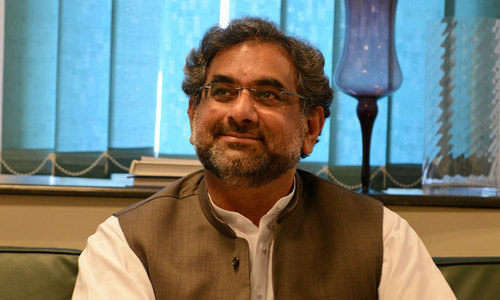ISLAMABAD: The Supreme Court on Friday dismissed a challenge to former prime minister Shahid Khaqan Abbasi’s candidature to contest the July 25 general elections from the NA-57 constituency in Murree, clearing the way for him to participate in the upcoming election from his hometown.
A two-judge Supreme Court bench, headed by Chief Justice Mian Saqib Nisar, took up an appeal filed by Masood Ahmed Abbasi, accusing the former prime minister of tampering with records by taking a loan of Rs25 million on a property worth Rs0.3m, even though the value of the property was listed in income tax returns, as well as in the nomination papers.
The court, however, observed that at the time when the property was purchased in 1976, the value of the property was Rs0.3m, but the petitioner insisted that the former prime minister had taken a hefty bank loan of Rs25m on the property.
When asked to explain what had prompted him to challenge Shahid Khaqan Abbasi’s nomination and whether he was contesting elections from the same constituency, the petitioner argued that he was a concerned citizen who had challenged Mr Abbasi’s candidature in his capacity as a voter.
An unhappy bench says the petitioner was interfering in something he was not supposed to
The court expressed its displeasure, stating that the petitioner was interfering in something he was not supposed to. The petitioner intended to derail the judicial process since he had been unable to produce any evidence to establish his grievance before the court, the apex court observed.
Earlier, Justice Mazahir Ali Naqvi of the Lahore High Court had also allowed Mr Abbasi to contest the election from the same constituency by suspending a decision of an election tribunal which had disqualified him for life for concealing facts and withholding information.
The tribunal’s decision stated that Mr Abbasi did not fulfil the requirements under Article 62(1)(f) of the Constitution. The court also sent a notice to the returning officer who had rejected the nomination papers.
The apex court also heard a separate case relating to sectarian terrorism in Dera Ismail Khan, and asked for a comprehensive report within a week. The court observed that the responsibility of providing security and protection to citizens rested with the state. The court also highlighted the need for a comprehensive policy to ensure peace and security in the country.
During the proceedings, the court received a report on behalf of the D.I. Khan district police officer, which conceded that the district had faced sectarian unrest since 1985.
However, there had been a decline in terrorism-related incidents owing to effective security measures. The DPO also acknowledged that 60 per cent of the people employed by the police force comprised people belonging to a particular sect.
The court was told that the police had failed to identify those responsible for the killing of 400 people over the last five years. The court ordered the government to take effective measures to ensure security for the people and summoned a comprehensive report from the authorities concerned.
Published in Dawn, July 14th, 2018












































